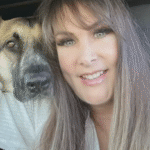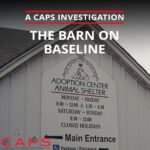Breeder: Jacobs, Nina
Business name: Happy Hollow Kennel
Address: 16421 Decal Pl
City, State Zip: New Cambria, MO
Year: 2012
USDA License: 43-B-0409
Date of CAPS Investigation: 2012-06-21
On the premises at the time of investigation: Approximately 150 dogs.
Breeds: Noted: Yorkshire Terriers, Pugs, Chihuahuas, Shih Tzus, Standard Poodles, Miniature Poodles, Wheaten Terriers, Persian Cats
The temperature at the time of the investigation was 93 degrees Fahrenheit and sunny.
Building Type #1:
I arrived at Ms. Jacobs’s home around 3 pm. She said that her state inspector had just left and the inspection went well, passing with few violations. She mentioned that the relationship with your inspector can completely make or break your inspection and that luckily hers liked her. During the time of my investigation, I noted several violations. Several dogs were kept in her home, including one nursing poodle with several puppies, which were in a laundry basket. She stated these were for sale and not pets. There was trash and clutter all over the home, making the area unsuitable for proper sanitation and organization (3.1(b) Housing facilities, general).
Building Type #2:
I was only able to visit one of Ms. Jacobs’s shelters, mostly holding puppies ready for or almost ready for commercial sale and several brokerage puppies. This enclosure was completely indoors and provided no outdoor access for the dogs. This is in violation of the new revisions to the Missouri Canine Cruelty Prevention Act, which require unfettered outdoor access for all dogs.
In this building, two puppies, one Shih Tzu and one Yorkshire Terrier, were isolated from their littermates due to weakness and/or illness. Ms. Jacobs, said that they were normal for their size and age. The puppies appeared lethargic and unresponsive. Small dogs can quickly become hypoglycemic and/or have various health issues that can be treatable by a veterinarian. Ms. Jacobs instead told me that small puppies (under 1-2 pounds) are often very sick and hard to keep alive to a sellable age, and this was not preventable other than by treating these dogs with NutriCal, a calorie supplement.
The dogs’ illnesses clearly surpassed normalcy and instead were more serious issues that needed veterinary care. It was implied these dogs would remain untreated and their current state is unknown. If a licensed veterinarian does not conduct daily observations, a mechanism of direct and frequent communication is required so that timely and accurate information on problems of animal health, behavior, and well-being are being conveyed to the attending veterinarian. This was not established for these dogs (2.40(a) Attending veterinary and adequate veterinary care) (2.40(b)(2) & (3) Attending veterinary and adequate veterinary care).




